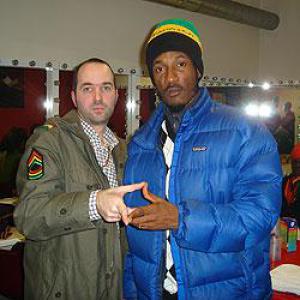Norrisman, if you look back, in which stage of your life did you know you wanted a career in music?
Norrisman: "That already started at a very tender age; I guess I must have been 11 or 12 years old. I kind of grew up in the soundsystem scene in the ghettos of Western Kingston. I believe my talent was always there though, it's an inborn concept, but I have to give thanks to my friends who pushed me hard enough to bring it into fruition."
Story has it that you were given your stage name because you were a big fan of martial arts star Chuck Norris.
Norrisman: "Yeah, growing up in the ghetto, the only thing we had readily available to entertain ourselves were the movie theatres. In the area where I grew up, you had a number of open air cinemas. A lot of Jamaicans grew up on western movies and karate flicks. From all these stars Chuck Norris was my favourite. To me he was more than just an actor, I saw him as my mentor. From that, my friends started to call me Chuck Norris as well, but I never accepted the full name and shortened it to Norrisman."
Did you just like the movies or did you really get involved in the whole martial arts thing?
Norrisman: "No, not really. I never got involved in that, but it's an image I like to carry out. If you have a look at my latest album, ‘Know The Road', you will see that I'm one the sleeve dressed in a karate suit. I'm just giving the people what they expect, you know. They've read my biography, know about the Chuck Norris thing, so why not?"
When did Rastafari find you?
Norrisman: "That was somewhere in the early nineties. The first conscious tune I recorded was a track called 'Persistence'. Rastafari really showed me who I am and what path I have to follow."
As a Rastafarian artist, what's your view on the clampdown that's now going on in Jamaica surrounding provocative and violent dancehall music?
Norrisman: "There's a balance in everything. At the end of the nineties Shabba Ranks really gave dancehall a push when he won a Grammy for his album 'As Raw As Ever'. Now at that time dancehall artists weren't as extreme as they are today. These days they're saying things on records that are outrageous in my opinion, so I can understand the decision of the Jamaican Broadcasting Commission to ban these songs, because their airwaves are open for anyone to listen to. Personally I think, in the end, positive music will always come up on top. A lot of the things that are happening in the Jamaican music business today have to do with money and greed, earning as much as possible as fast as possible. There's too much vanity out there as well, only very few artists out there really do it solely for the love of the music anymore."
Record sales keep dropping. How do you cope with that?
Norrisman: "Well, what it comes down to is performing live, but even there the recession has hit, so it isn't always evident anymore to tour with a full live band. More and more artists are becoming independent these days. That includes myself, because I want to set up my own production company Home & Away Productions, so I can set everything up just the way I want it."
Here in Europe "Home And Away" is a well-known Australian soap series.
Norrisman: "Yeah man, it runs on Jamaican television as well. I wanted something universal for the title, because I want everybody to understand what I'm trying to get across."
To end the interview I'm just going to confront you with some words. The first one is: Africa?
Norrisman: "For Rastafarians Africa is the focus; it's the original home of all black men. As the descendants of the slaves and especially as musicians who have been singing songs of repatriation for many years now, I think we should be entitled to a place there, just a piece of land we can call home."
Ethiopia?
Norrisman: "Ethiopia immediately makes me think of Shashamene, that piece of land that was given to the Rastafarians when Haile Selassie I visited Jamaica in 1966."
And last but not least: Norrisman?
Norrisman: "It's hard to define Norrisman, because I like things to be undetermined and keep an open mind. Again I have to mention universality; using music as a language without boundaries. I've always kept my own life private, but if you listen attentively to my songs, you can get an idea of what I've been through and what I've experienced. Each of my albums is like a volume in the continuing story that is my life."


